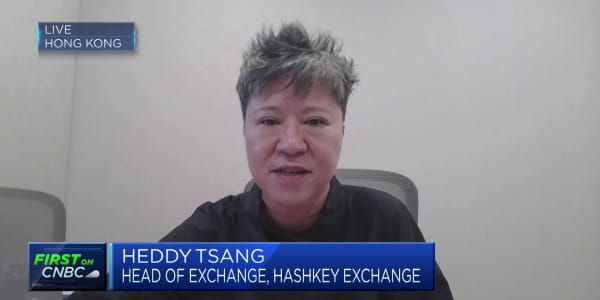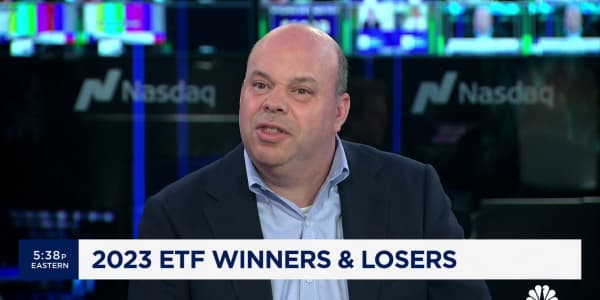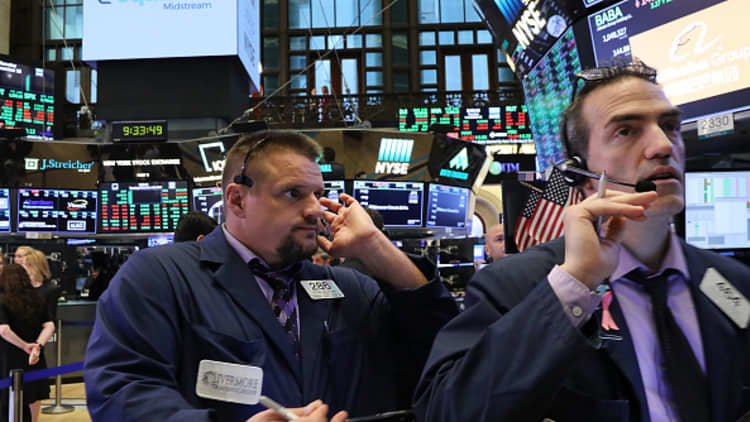
Everyone is concerned about an overvalued stock market. And they should be. You don't reach a full decade of a bull run without asking the reasonable question about stock values. A simple explanation that Warren Buffett once gave for knowing when the market is overvalued doesn't present a full-throated endorsement of market bargains being plentiful right now.
The Berkshire Hathaway chairman and billionaire investor told attendees at the Berkshire annual conference back in May 1998, only a few months before stocks plummeted, that the easiest way to gain confidence that the market is not overvalued is if two conditions are met: "Interest rates remain at or near present levels or go lower, and that corporate profitability in the U.S. stay at the present — or close to the present — levels," which at the time Buffett was speaking were "virtually unprecedented."
"If the two conditions are met," he said, "I think it's not overvalued. And if either of the conditions is breached in an important way, I think it will turn out to be overvalued."
The comments were actually a reinforcement of what Buffett had written in his annual letter to shareholders the year before.
Anyone who follows the markets knows there are widespread concerns right now that stocks are at peak earnings power. Meanwhile, the Federal Reserve is raising interest rates, and it is not only President Donald Trump blaming it for the recent stock market woes, hedge fund giant Ray Dalio said on Thursday that the Fed is causing asset prices to go down.
It would seem that there is good reason to be reminded of Buffett's words about interest rates. In the late '90s, Buffett also provided a rare presentation at the Allen & Co. conference for industry moguls, in which he said that when interest rates are low, companies get too much easy money and there is no place for investors that makes sense but stocks. Ultimately, the problems will surface and no longer support a rising market. Some of today's tech giants would have been good long-term bets regardless, but about many other stocks, Buffett was right.
Other than his huge stake in Apple — which certainly fits another Buffett mantra, buying great brands that maintain a competitive moat around their value — the billionaire investor hasn't made a major acquisition in years, even though he is sitting on more than $100 billion in cash. The biggest deal he recently made was to buy back near-$1 billion in shares of his own company's stock, a buyback decision he said would be made only at times when he felt Berkshire was trading below its intrinsic value.
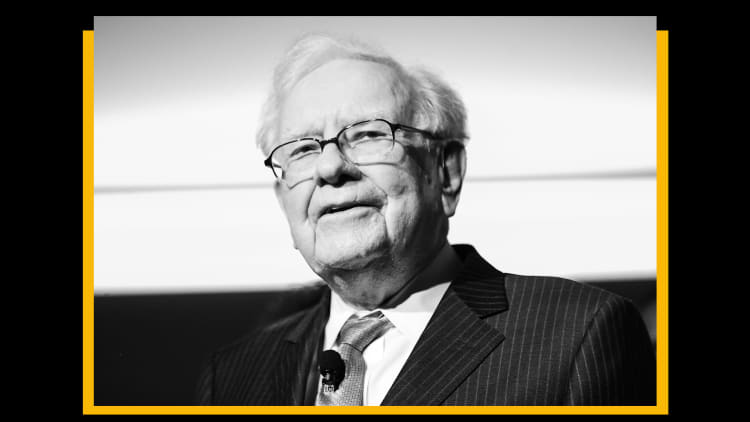
The $4 billion stake in J.P. Morgan revealed on Wednesday isn't massive, but it does add to Buffett's particularly big bet on U.S. banks — taking it up to roughly $80 billion (if his $16 billion American Express stake is included), which is about 15 percent of Berkshire's $530 billion market cap. Berkshire also invested in PNC Financial and added to several other existing bank holdings in its stock portfolio in the most recent quarter, ended Sept. 30.
"JPM is undoubtedly one of the best managed banks in the world, even though it may not be trading at rock-bottom valuations," said Neena Mishra, director of ETF research at Zacks Investment Research.
Five of Berkshire's 10 top stock holdings are now banks.
By a simple measure of stock market value, at a time when investors are questioning values across the board, financials are cheaper than other sectors. The forward price-to-earnings ratio for the S&P 500 is 16.2. For tech it is 17 and consumer discretionary 20.8. Health care, which has been the hottest sector this year, is trading at a forward P/E of 16. Financials are currently trading at a forward P/E of 11.9. Within the financial sector, when you slice the niches even finer, the diversified banks have the lowest forward P/E, at 10.4, according to Yardeni Research.
The current financials sector P/E is a discount to its historical average of 13.4, according to CFRA data. It is trading at 0.84x relative to the S&P 500, which is 20 percent below its historical average valuation.
Watch: Warren Buffett's in-depth interview reflecting on the financial crisis
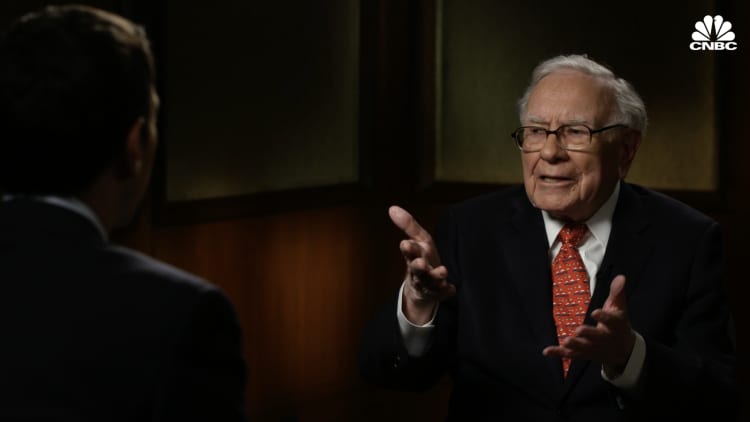
Berkshire has been buying stocks beyond banks. In fact, net purchases of stocks through the first nine months of the year were $24.4 billion, more than double what the company bought through June. And Berkshire did also reveal a stake on Wednesday in a technology stock: Oracle. (Oracle is trading at a forward P/E that is lower than many other names in the tech sector.)
There are many ties between Buffett and J.P. Morgan. One of his two stock picking lieutenants, Todd Combs, sits on the JP Morgan board; Buffett has long pointed to J.P. Morgan CEO Jamie Dimon's annual letter as the one he thinks everyone should read; he and Dimon have started a new health-care initiative with Jeff Bezos of Amazon. But at a moment in market tumult when the notoriously stingy billionaire is being careful with his massive $100 billion pile of cash, it is worth noting that one thing the bank stocks offer is a relatively inexpensive valuation compared to many other stock sectors.
You don't need to be Buffett to buy all these banks
Investors don't need to be Buffett to buy the banks in one fell swoop; ETFs can handle that. As one example, the Invesco KBW Bank ETF (KBWB) provides strong exposure in a concentrated ETF to Buffett's banking stocks, according to Todd Rosenbluth, director of mutual fund and ETF research at CFRA. Bank of America, J.P. Morgan, US Bancorp, Wells Fargo and Citigroup (one bank stock Berkshire doesn't own) make up 40 percent of the portfolio. "This is higher than the cap weighted XLF that also holds insurance companies and capital markets ones or the equally weighted KBE," Rosenbluth said.
KBWB also has among its top 10 holdings several of Buffett's other big bank bets, M&T Bank, PNC and Bank of New York Mellon.
Of course there may be reasons why banks are cheaper than other stocks. The flattening yield curve remains a big challenge, particularly for regional banks, according to Mishra. And there is no shortage of factors to worry about, from the global economic slowdown to Brexit and regulatory risks due to Democratic takeover of the House and critical comments from Rep. Maxine Waters about financial companies, who now heads the Financial Services Committee in the House. Rising rates may also impact mortgage originations going forward.
In fact, that's why investors have been dumping financial ETFs. The biggest financial ETF, the Select Sector SPDR Financial (XLF) has lost about $2.4 billion this year. And most of the financial ETFs, including the bank plays, are in the red for 2018. XLF is down by more than 4 percent, "though it rebounded slightly over the past month as there was some sector rotation out of earlier high-flying tech sector into beaten down sector," Mishra said. KBWB is down by close to six percent.
Meanwhile, Mishra described big bank Q3 earnings as "good," supported by consumer banking and cost controls.
XLF is currently trading at 12.4 times forward earnings, which looks attractive compared with long-term historical averages, but it has been even lower at other recent points of comparison. Over the last five years, it has traded between roughly 10 and 14 times. "Bank valuations have been, in general, remained subdued since the financial crisis even though they are much better capitalized now," Mishra said.
There are additional ETF options. Mishra recommended XLF, which even though it is not a bank-only play, includes Berkshire Hathaway, J.P. Morgan, Bank of America, Wells Fargo, US Bancorp, American Express, Goldman Sachs and PNC in its top holdings, accounting for roughly 50 percent of the portfolio.
Other ETFs with similar exposure include the Vanguard Financials Index ETF (VFH). The iShares US Financial Services ETF (IYG) also has some of the Buffett's favorite banks as its top holdings — J.P. Morgan, Bank of America, Wells Fargo, US Bancorp, American Express and Goldman Sachs account for more than 35 percent of the portfolio.
When Buffett in the early years of his original investment partnership became known around town, both Omaha and Wall Street, as a stock picker to follow, he was still mostly buying stocks that were cheap and would be worth more once they were broken up and sold off for the value of their parts. But that changed as Berkshire grew in size, and he became more sensitive to the human impact of shutting down firms, and especially as his relationship with Charlie Munger, Berkshire's vice chairman, evolved. Munger helped to migrate Buffett to a method of evaluating the quality of companies rather than just their break-up value. "Fair companies at wonderful prices" was replaced as the investment thesis with "wonderful companies at fair prices." At other times, when he is being slightly less poetic, Buffett also has used "good" instead of "wonderful" when referencing this equation.
It must be said that Buffett would never use a ratio like price to earnings alone to value a stock or make a short-term call. In fact, he said in his 1992 letter to shareholders in a takedown of value investing that it "connotes the purchase of stocks having attributes such as a low ratio of price to book value, a low price- earnings ratio, or a high dividend yield. Unfortunately, such characteristics, even if they appear in combination, are far from determinative as to whether an investor is indeed buying something for what it is worth and is therefore truly operating on the principle of obtaining value in his investments. Correspondingly, opposite characteristics - a high ratio of price to book value, a high price-earnings ratio, and a low dividend yield - are in no way inconsistent with a 'value' purchase."
Nonetheless, P/E does remain a measure that many investors use as a proxy for relative valuation in the market.
Buffett also would sometimes get miffed that people would be piling into his stock bets. "Riding his coattails" was not something he considered to be an ethical practice. But that was decades before everyone had access to 13F quarterly stock holdings filings in seconds, and well before the rise of ETFs.
For more of Buffett's views consult CNBC's Warren Buffett Archive, the world's largest collection of Buffett speaking about business, investing, money and life.



